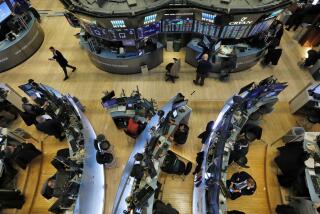All Eyes Are Now on Brazil
Stocks and currencies plunged erratically across Latin America on Friday as analysts fretted over Brazil, where the battle to defend its currency is seen as a crucial test in keeping the region from descending into a full-blown crisis.
Brazilian stocks suffered a vertiginous 10% decline, before recovering most of the loss, as fears spread that the continent’s largest economy might be forced to devalue its currency, the real, in the face of investor disenchantment with emerging markets overall.
Trading in the Sao Paulo exchange was halted after the morning’s free fall, which was fueled by the deteriorating economic condition of neighboring Venezuela, disclosures that up to $5 billion in capital has fled Brazil in recent weeks, and speculation that interest rates are headed up.
Brazil’s chaotic market, which ended the day down 2.8%, was hardly unique. Shaken by the U.S. bombings of terrorist sites in Afghanistan and Sudan and the continuing fallout from Russia’s devaluation and debt default, most Latin America markets went south. Stocks in Venezuela, where a devaluation may be imminent, lost 8.4% on Friday. Argentina’s Merval index lost 7.8%; Chile’s IPSA was down 4.3%.
There were also fresh concerns about Mexico as the Bolsa stock index fell 2.45% and the peso sank to a historic low of 9.74 per dollar on the 48-hour spot market, down from its open of 9.55.
There were also reports that Mexico’s government might raise interest rates to defend its currency, a move that would probably put the brakes on Mexico’s strong economic growth of recent months.
But Brazil’s condition came under special scrutiny because of its size, importance in the Mercosur trading block and its status as the world’s largest destination of foreign investment after China.
A devaluation would effectively reverse Brazil’s four-year campaign to stabilize its economy after decades of mismanagement and hyperinflation.
While economists continued to laud the country’s improved economic fundamentals, they warned that Brazil’s high trade and budgetary deficits are raising fresh doubts that Brazil’s real could withstand further speculative assaults. That’s because of the rising cost of the debt it is taking on to finance those deficits.
“High deficits force governments to go out and borrow money. And because Russia has defaulted on some of its foreign debt, emerging nations must now pay more for those loans, a cost that only adds to the red ink,” said Amaury de Souza, a political scientist at Techne in Rio de Janeiro.
And when emerging-market countries can’t secure affordable loans to finance their deficits,” it creates a spiral. . . . The situation gets worse. . . . The market starts to wonder where the money is going to come from,” said Michael Henry, a Latin American economist at ING Barings in New York.
If Brazil were forced to devalue, Argentina--despite new lines of defense against currency assaults--might have to follow suit because the two economies are closely intertwined, economists fret. One-third of Argentina’s exports go to Brazil, its largest trading partner.
Salomon Smith Barney equity strategist Jim Barrineau said that so far the Latin American market problems, aside from Venezuela, are basically psychological and a residue of Asian and Russian turmoil. But there comes a time when market problems caused by lack of confidence will begin to impinge on the fundamental economies if instability persists.
Brazil and Argentina could feel the effects from market gyrations if fears of a devaluation cause a panic run on banks by depositors. To stop runs in the past, Brazil and Mexico have sharply raised interest rates to discourage speculators and attract foreign capital. But those higher rates carry a cost of higher inflation and tighter credit.
“The big risk is that these emerging markets will have to again tighten their belts both fiscally and monetarily to restore confidence,” Barrineau said.
Just the threat of a devaluation typically causes a slowdown in foreign investment, said Rafael de la Fuente of Paribas. “If you are a U.S. oil company investing in Venezuela, you’re waiting to buy trucks or other capital equipment there because with a devaluation next week or next month, your dollars could buy more,” de la Fuente said.
The consensus on Brazil among analysts such as Josephine Jimenez, senior portfolio manager of Montgomery Emerging Markets Fund in San Francisco, is still positive overall, however.
“I remain unshaken in my faith in Brazil. Market sentiment is one thing, but on fundamental grounds, Brazil is looking good in terms of reforms and growth outlook,” Jimenez said. She added that the country’s $70 billion in foreign reserves gives it ample protection against a speculative currency attack.
Sidney Weintraub, political economist at the Center for Strategic and International Studies in Washington, said that “leaving aside Venezuela, the skittishness investors feel these days reflects less what’s happening in Latin America than what’s happening in other parts of the world.”
“That Russia defaulted on its debt is a problem not because these countries trade with Russia but because investors are wondering whether other emerging-market countries will pay their debts. This could cause people to hold off on their investments in Latin America until the picture becomes clearer,” Weintraub said.
* ECONOMIC CONCERNS GROW
U.S. markets fall broadly on deep global sell-offs. A1
Russia’s government is under fire for the financial crisis
More to Read
Sign up for Essential California
The most important California stories and recommendations in your inbox every morning.
You may occasionally receive promotional content from the Los Angeles Times.









